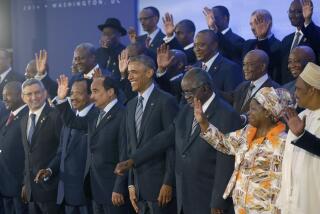Obama’s trip may fortify U.S.-Egypt trade ties
- Share via
As President Obama arrives in Egypt today to deliver a much-anticipated speech on U.S.-Middle East relations, businesspeople on both sides of the world are hoping his trip will pave the way for increased commerce.
Egypt is striving to become a trade hub in the Middle East on the strength of its favorable geographic location, purchasing power and consumer culture. The United States is stuck in the worst recession since the 1930s -- worsened by sluggish consumer spending.
Put the two together and benefits will flow, several trade experts said.
“Egypt can offer U.S. companies many advantages, including a large domestic market of almost 80 million consumers” and Egypt’s many bilateral trade agreements with “almost all major world markets,” said Rachid Mohamed Rachid, Egyptian minister of trade and industry, in a interview from his Cairo office.
In May, the U.S. and Egypt announced that they would bolster trade and investment ties. Both U.S. and Egyptian trade experts said that fostering bilateral trade and business relations could help stabilize political relations.
“We as an organization believe that trade and business relations are an underpinning relationship with any society,” said Chuck Dittrich, vice president of regional trade initiatives with the National Foreign Trade Council in Washington.
Last month, Rachid visited the U.S. and, along with U.S. Trade Representative Ron Kirk, issued a joint statement that said deepening trade ties should mesh well with the strong cooperation between Washington and Cairo on political and security matters.
Ahmed Chebbani, chairman of the Michigan-based American Arab Chamber of Commerce, agreed: “Prosperity and peace go hand in hand. If you don’t have one, you can’t have the other.”
“People, after all, have the same concerns wherever they come from,” Chebbani said. “They need housing, healthcare, food. . . . And when you have these things, you have political stability.”
Secretary of State Hillary Rodham Clinton, after meeting with Egyptian Foreign Minister Ahmed Aboul Gheit in preparation for Obama’s trip, promised strong U.S. backing to promote economic opportunity in Egypt. “I want to stress economic opportunity because out of economic opportunity comes confidence, comes a recognition that people can chart their own future,” she said.
Egypt is the 36th-largest export market for U.S. goods, totaling $6 billion in 2008, up from $5.3 billion in 2007. U.S. imports from Egypt were down 0.3% last year to $2.4 billion.
U.S. exports to the most populous Arab country include wheat, corn, soybeans and aircraft. Among the imports are petroleum, petroleum products, natural gas, textiles, apparel, steel, cement and cotton.
The Egyptian trade minister said that Egypt wanted to double trade with the U.S. in the next four years but was not discussing a trade agreement.
“This is not a bad or negative thing at all,” Rachid said. “It is simply the result of recognition by both sides that this is not necessarily the way to boost trade.”
He added that although the U.S. signed trade agreements with several countries in the region, including Jordan, Bahrain, Oman and Morocco, their total trade with the U.S. reached only around $2 billion.
Dittrich said a trade agreement would be politically unlikely for a Congress more interested in protecting U.S. industry than promoting cheaper goods from abroad.
“Trade protectionism and ‘Buy American products’ is a symptom of the mood of Congress . . . and skepticism of trade, and the current U.S. administration has to make efforts to counter this skepticism,” he said. “They have to come up with a strategy of how they’re going to engage with Congress on the issue of free trade before they engage with the rest of the world.”
A better approach than a trade agreement, Dittrich said, would be to expand a program under which goods from specified zones in Egypt already enjoy preferential terms in the U.S. market provided that a certain percentage of Israeli goods are used.
Dittrich said business relations with Egypt and the Middle East also would strengthen the Arab world’s understanding of the U.S.
“There’s a huge population in Egypt and the Middle East who are very young people, born in the last 15 to 20 years. And in the 15-to-20-year period, there’s been a lot of controversial and unfortunate images of the role of the U.S. in the world,” he said.
“So by engaging in business relations, we can show these young people a different side of the U.S. And I think that’s what President Obama is doing by speaking in Cairo and addressing the Muslim world.”
--
More to Read
Sign up for Essential California
The most important California stories and recommendations in your inbox every morning.
You may occasionally receive promotional content from the Los Angeles Times.










